Introduction
In the rapidly evolving realm of software development, the integration of DevOps practices has emerged as a pivotal strategy for organizations striving to enhance efficiency and responsiveness. By bridging the gap between development and operations, DevOps not only accelerates the software delivery process but also fosters a culture of collaboration and continuous improvement.
As businesses increasingly adopt these methodologies, the landscape is witnessing a significant shift characterized by heightened deployment frequencies and improved product quality. However, navigating the complexities of DevOps integration presents its own set of challenges, from legacy systems to cultural resistance.
This article delves into the multifaceted aspects of DevOps, exploring its benefits, the criteria for selecting service providers, and the future trends that will shape this dynamic field. By understanding these elements, organizations can position themselves to harness the full potential of DevOps, securing a competitive advantage in an increasingly digital marketplace.
Understanding DevOps: A Key to Modern Software Development
This approach includes a thorough collection of methods that combines software development (Dev) with IT operations (Ops), which is a key focus of devops solution providers, striving to reduce the systems development life cycle while providing high-quality software. This approach is increasingly relevant, as more than half of surveyed teams have adopted DevOps practices with the help of devops solution providers to deploy containers, reflecting a significant shift in how software is developed and delivered. By fostering a culture of collaboration, automation, and continuous improvement, organizations can utilize devops solution providers to respond more swiftly to market demands and customer feedback.
As noted by research expert Lionel Sujay Vailshery,
Therefore, the team members need to know all parts of the software development cycle and not just some parts of it.
This holistic understanding is essential for leveraging the full potential of development and operations. Furthermore, with over 11,029 engineers in the US, where 16.1% are women, the workforce diversity underscores the importance of collaboration in the industry.
The typical yearly salaries for infrastructure engineers, ranging from $83,710 to $126,399 based on experience, highlight the economic implications of adopting such practices, reinforcing its significance in aligning technology initiatives with business goals. The case study titled 'Automation in DevOps' illustrates how successful devops solution providers leverage multiple tools and automation to minimize manual processes and enhance efficiency across the development lifecycle. The ongoing developments in software operations culture emphasize the importance of collaboration, further solidifying its role in improving overall software development efficiency.
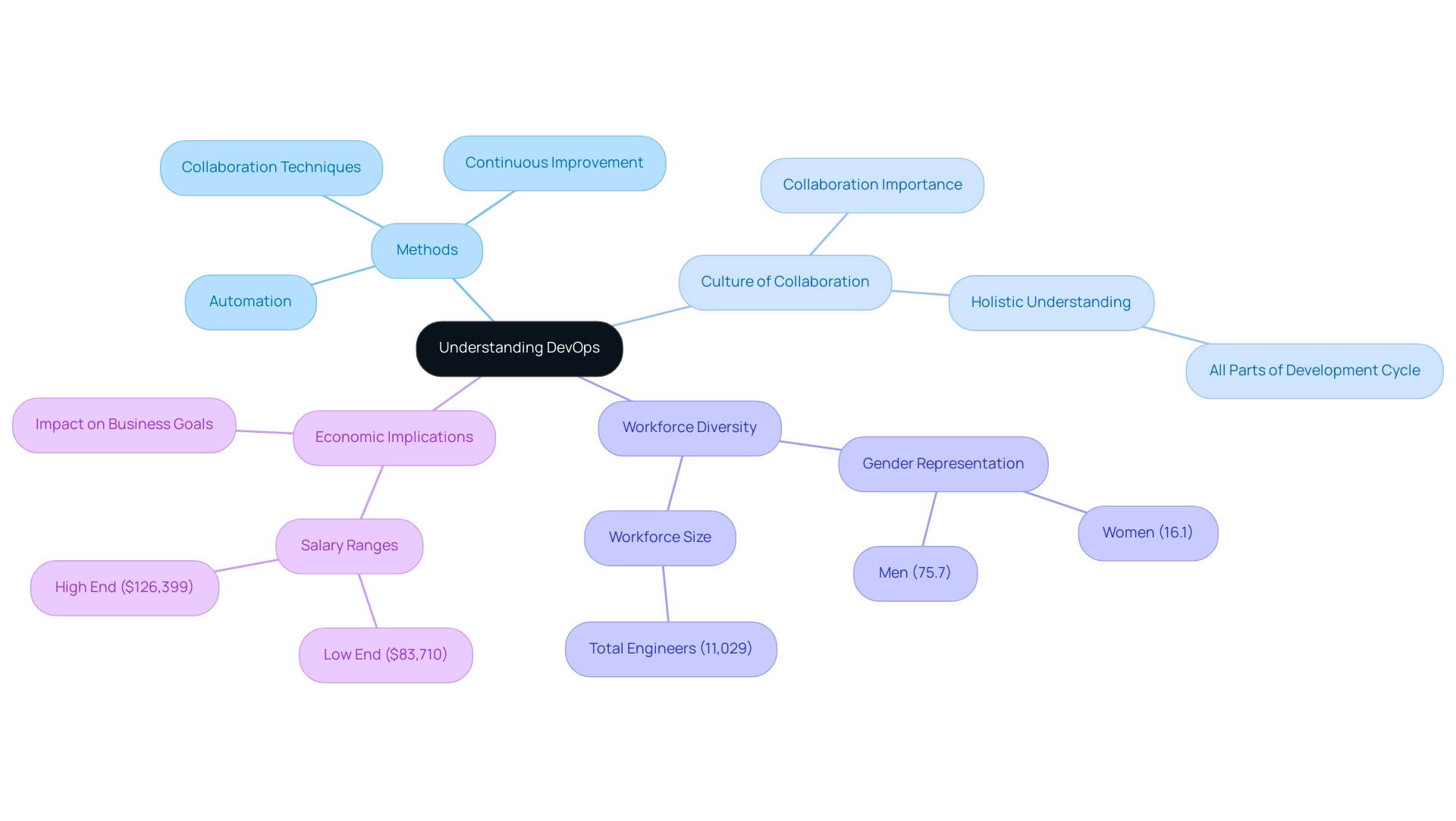
How to Choose the Right DevOps Service Provider for Your Needs
Selecting the appropriate devops solution providers in 2024 necessitates a strategic approach that includes several essential factors. First and foremost, entities must evaluate the technical expertise of devops solution providers in relevant tools and technologies, ensuring that these providers possess a deep understanding of industry-specific challenges. With 6.8% of companies utilizing DevOps emerging from India, it is critical to recognize the global landscape and the varying levels of proficiency available.
Additionally, understanding the financial implications is vital; DevOps engineers typically charge between $30 and $80 per hour, which can significantly impact budget considerations.
Scalability is another crucial factor; entities should confirm that the devops solution providers can accommodate their growth and seamlessly adapt to evolving requirements. The level of support and training offered by devops solution providers is equally important. A robust change management strategy can significantly enhance the transition process, further streamlined by effective collaboration between development and operations.
This is evidenced by case studies demonstrating that entities with optimized workflows can achieve faster and higher-quality releases.
Furthermore, the adoption of established technologies like Kubernetes, which is now utilized by more than 50% of Fortune 100 companies, underscores the importance of selecting a provider that is proficient in such platforms, ensuring automation and resilience in cloud-native development workflows.
Cultural alignment with the devops solution providers cannot be overlooked. A partner that resonates with your organizational culture fosters smoother collaboration and integration, which ultimately leads to better outcomes. As Harikrishna Kundariya, CEO of eSparkBiz, aptly notes, 'According to IBM, Artificial Intelligence is what makes computers, robots, and other machines imitate certain abilities of human intellect like learning, reasoning, recognizing objects, problem-solving.'
This insight reinforces the necessity for a provider that not only understands technological advancements but also aligns with the comprehensive vision of your entity. In summary, the careful evaluation of the key factors will enable companies to make informed choices when selecting a service partner.
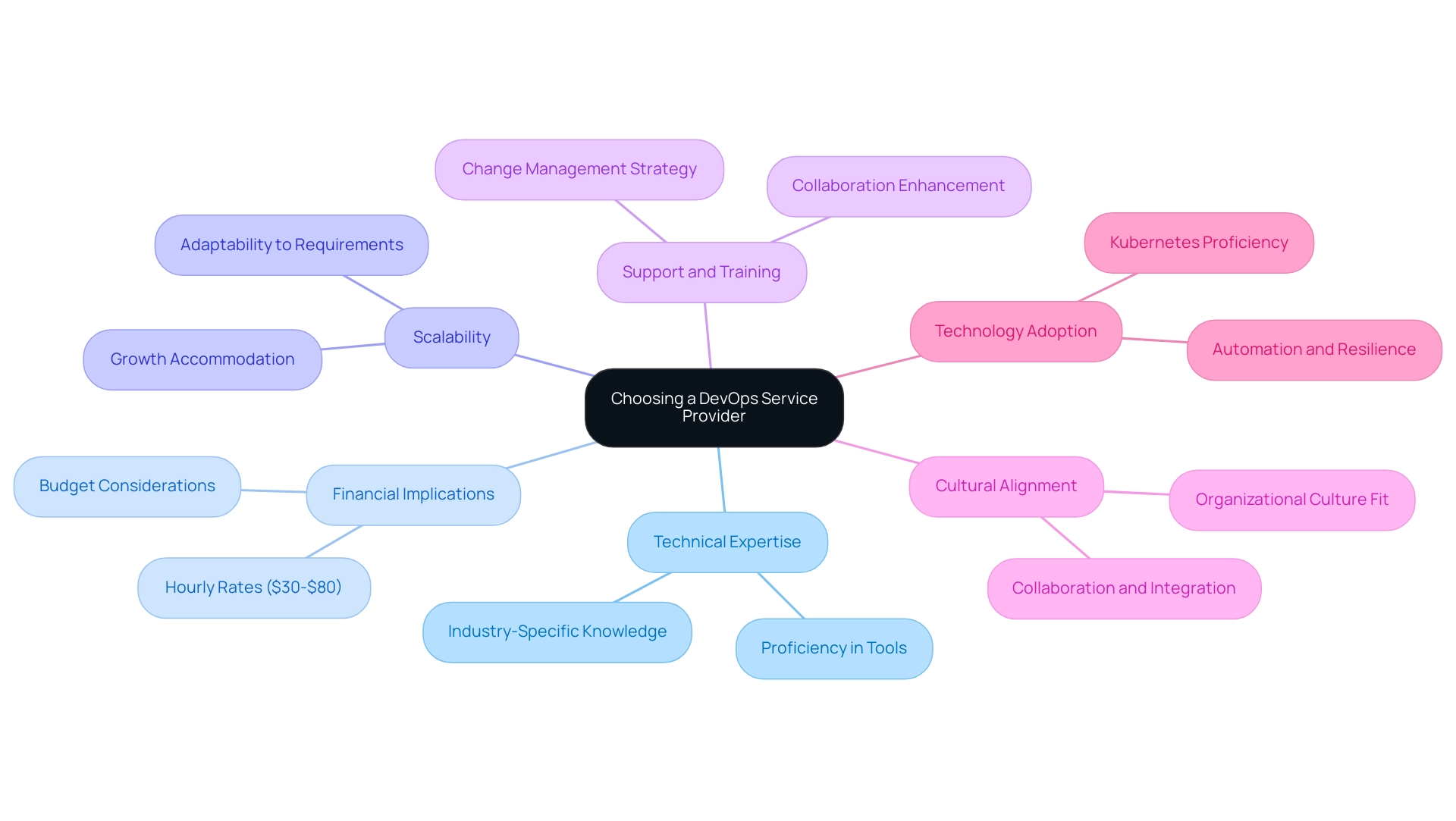
The Benefits of Implementing DevOps Services
The introduction of development and operations services by devops solution providers offers numerous strategic benefits for companies. A key benefit is the significant increase in deployment frequency, which enables faster time-to-market and enhances the ability to respond to evolving customer demands. This shift is especially significant, as recent statistics show that 6.8% of companies employing this methodology are from India, reflecting a growing trend in its adoption that leads to substantial improvements in deployment metrics.
For instance, entities that adopt these practices can achieve a deployment frequency that is markedly higher than their traditional counterparts, driving competitive innovation. Moreover, the integration of software creation and operations by devops solution providers encourages a collaborative culture that nurtures collective responsibility and results in improved product quality. The case study titled 'DevOps Culture and Collaboration' exemplifies this, demonstrating how closer collaboration between teams accelerates software development speed and boosts product quality, ultimately helping organizations meet rapidly changing market demands and technological advancements.
Moreover, the automation of repetitive tasks characteristic of development and operations methodologies reduces the risk of human error, enabling resources to be shifted toward innovation. Tools such as Atlassian’s Open Development Operations provide crucial integrations that support these methods, allowing teams to create and manage software efficiently. Consequently, entities that adopt DevSecOps can expect enhanced operational effectiveness, cost savings, and a fortified competitive stance in the market.
Jane Smith, CFO, notes,
We expect significant growth next quarter, reflecting the positive outlook associated with adopting these transformative methodologies as we move into 2024.
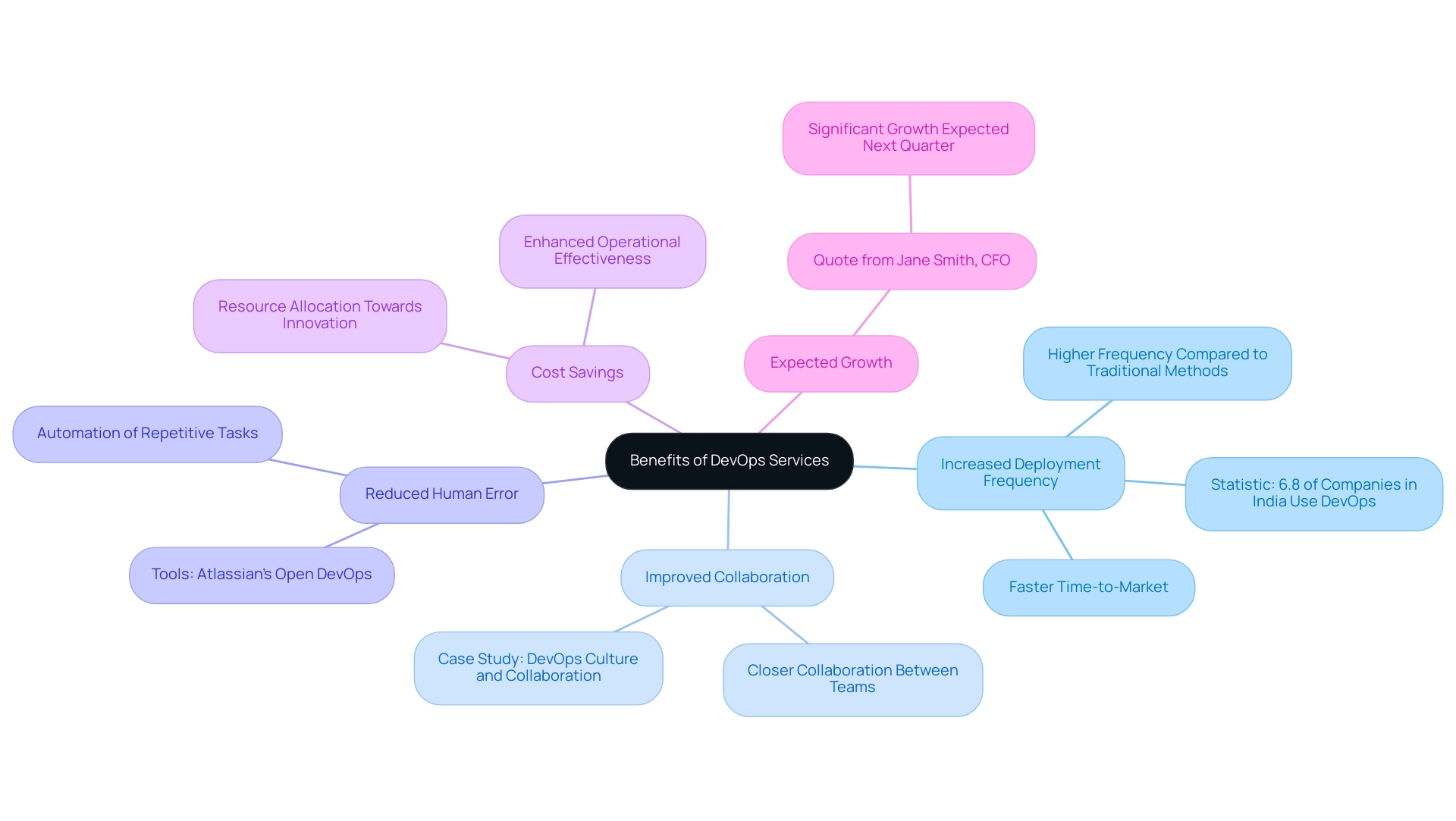
Navigating Challenges in DevOps Integration
Integrating development and operations practices poses significant challenges for organizations, particularly as 29% of leaders in this field cite legacy systems and infrastructure as major hindrances for devops solution providers. This statistic highlights the essential nature of these challenges in the context of integration. Common obstacles include:
- Resistance to change
- Misalignment between development and operations teams
- Inadequate tooling
As mentioned by Logz, "While many have embraced the development and operations approach, 15% are in the planning stages, and 9% have yet to adopt it." These statistics indicate a prevalent hesitation within the industry. To navigate these complexities, entities must prioritize effective change management strategies that emphasize clear communication and comprehensive training for all stakeholders.
Establishing cross-functional teams can effectively bridge gaps between departments, fostering a culture of collaboration essential for success. Furthermore, investing in the right tools from devops solution providers that facilitate automation and continuous integration is crucial for overcoming technical hurdles. A pertinent case study illustrates this: 50% of companies experience delays of hours to weeks in fulfilling access requests due to poor infrastructure access management.
By incorporating access management into development and operations workflows, organizations can not only expedite access but also enhance security, demonstrating the tangible benefits of addressing these challenges head-on. Furthermore, as technology teams increasingly focus on maximizing the value from their tools to automate repetitive tasks and enhance productivity, supported by remote collaboration methods, the need for robust change management becomes even more evident.
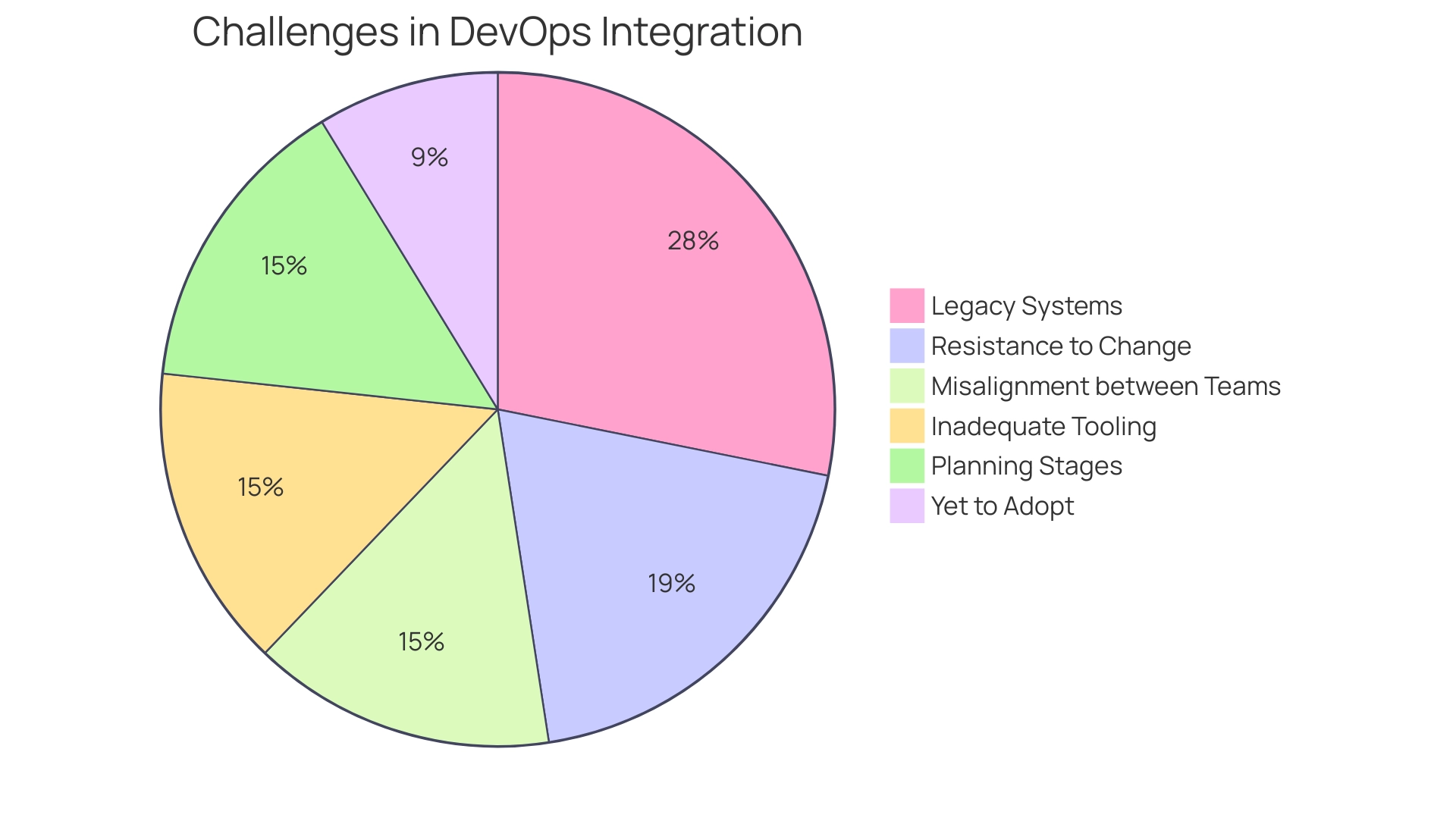
Future Trends in DevOps: What to Expect
The landscape of software development and operations is on the brink of a transformative evolution, largely influenced by technological advancements and the shifting demands of businesses, which highlights the role of devops solution providers. A significant trend is the increasing incorporation of artificial intelligence (AI) and machine learning (ML), which are enhancing automation and improving decision-making processes within development and operations practices. As highlighted by Colorwhistle, over 70% of emerging business applications will depend on low code by 2025, signifying a strong trend towards simplified tools that enable quicker deployment and integration.
Furthermore, the transition to remote work requires companies to reevaluate their collaboration tools and methods, encouraging the creation of more flexible and adaptive frameworks.
The growing emphasis on security within the software development lifecycle has culminated in the adoption of DevSecOps, where security practices are integrated from the outset. This is particularly vital as 45% of technology leaders report cultural resistance as a significant barrier to effective implementation, highlighting the need for a cultural shift within organizations. Moreover, the average annual salaries for development and operations engineers, ranging from $83,710 for those with a year of experience to $126,399 for those with three to five years, underscore the increasing demand and value of these professionals in the evolving landscape.
Moreover, DORA’s survey of over 33,000 professionals indicates that development and operations methodologies, which are commonly adopted by devops solution providers, are gaining traction across various industries, including non-profits, energy, and healthcare, emphasizing the broader applicability and relevance of these approaches beyond the technology sector. Therefore, staying informed about these trends will be essential for organizations aiming to secure a competitive edge in the rapidly evolving tech landscape, particularly in the context of the adoption of AI and ML in DevOps practices as we look towards 2024.
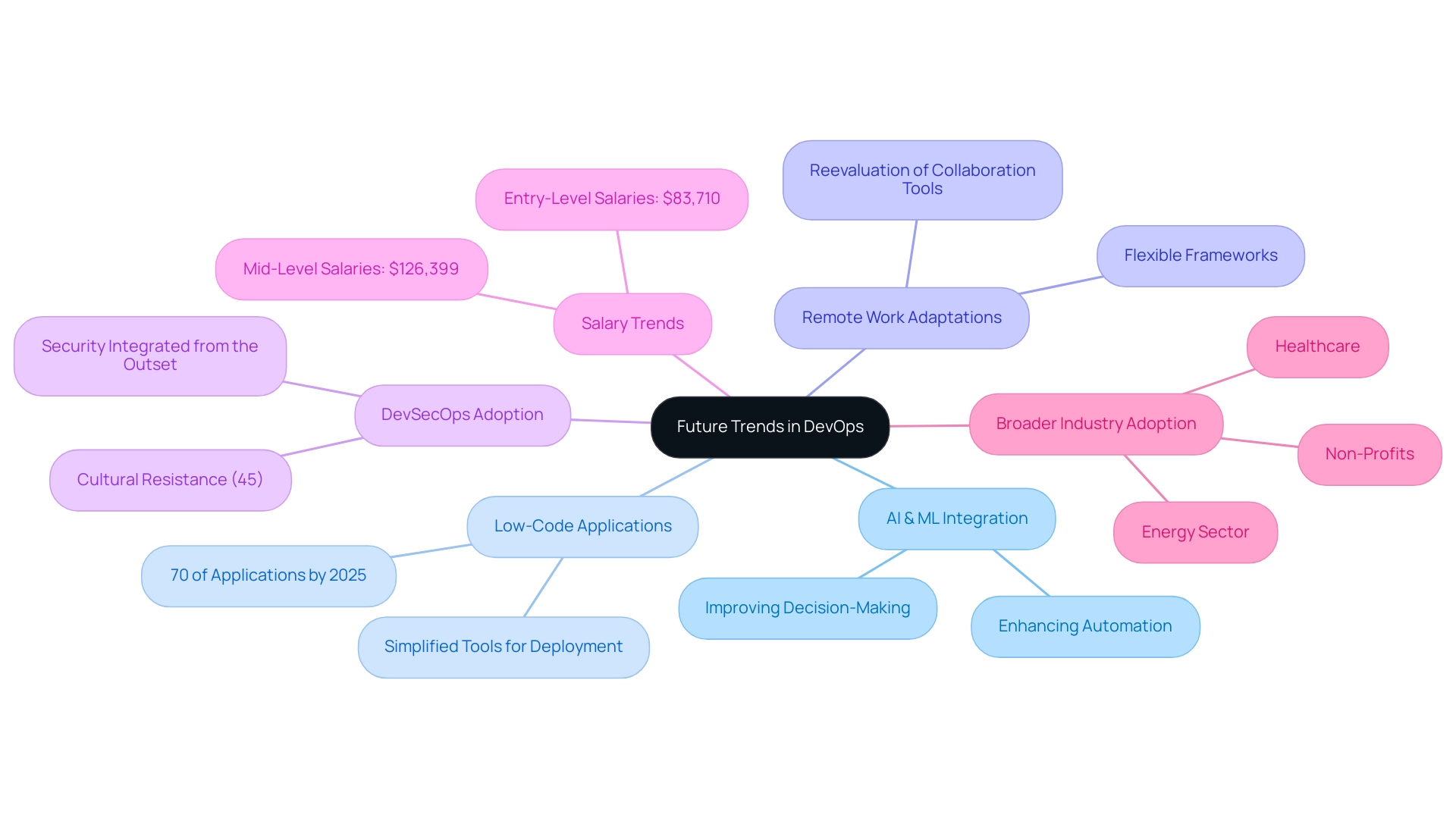
Conclusion
The integration of DevOps practices stands as a cornerstone for modern software development, driving efficiency and fostering a culture of collaboration. By bridging the gap between development and operations, organizations can significantly enhance their deployment frequencies and product quality, ultimately leading to a more responsive approach to market demands. The insights gathered throughout this article highlight the necessity of understanding the multifaceted aspects of DevOps, from selecting the right service provider to navigating integration challenges.
Choosing an appropriate DevOps partner is crucial, necessitating a strategic evaluation of:
- Technical expertise
- Cultural alignment
- Financial implications
Organizations that prioritize these factors are better positioned to leverage the full potential of DevOps, facilitating a smoother transition and optimized workflows. Moreover, the benefits of implementing DevOps services, such as increased deployment frequency and improved collaborative efforts, further reinforce the competitive advantages that can be gained.
However, the journey is not without its challenges. Legacy systems and cultural resistance remain significant obstacles that organizations must address through effective change management and the adoption of appropriate tools. As the landscape continues to evolve, staying abreast of future trends—such as the integration of AI and the rise of DevSecOps—will be essential for maintaining a competitive edge.
In conclusion, embracing DevOps is not merely a trend but a strategic imperative for organizations aiming to thrive in an increasingly digital marketplace. By understanding its complexities and committing to a culture of continuous improvement, businesses can unlock new levels of operational efficiency and innovation, ensuring their readiness for the future.




